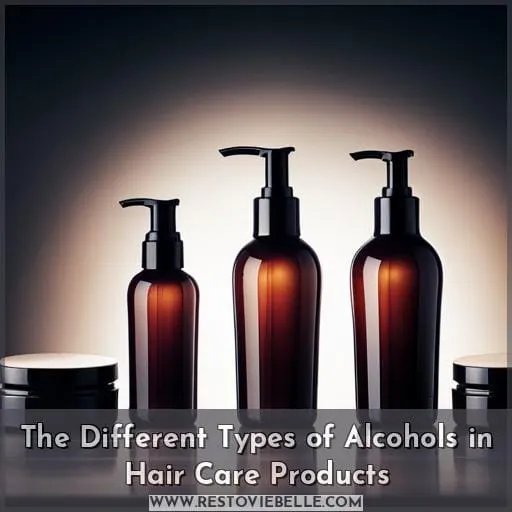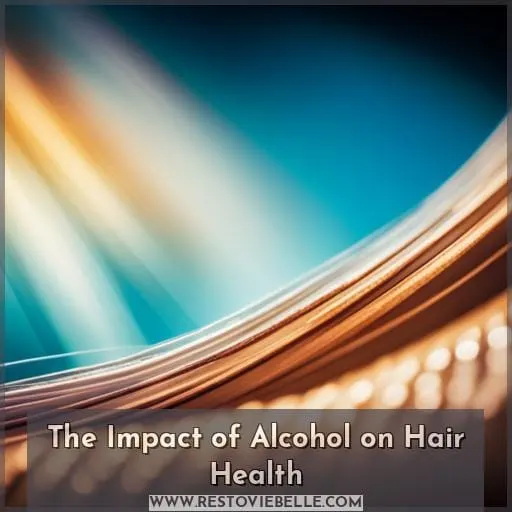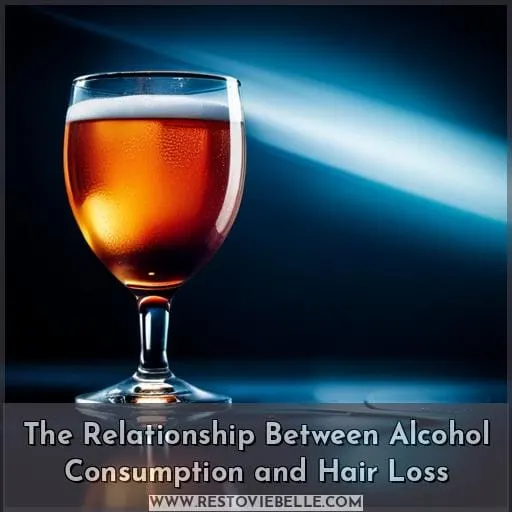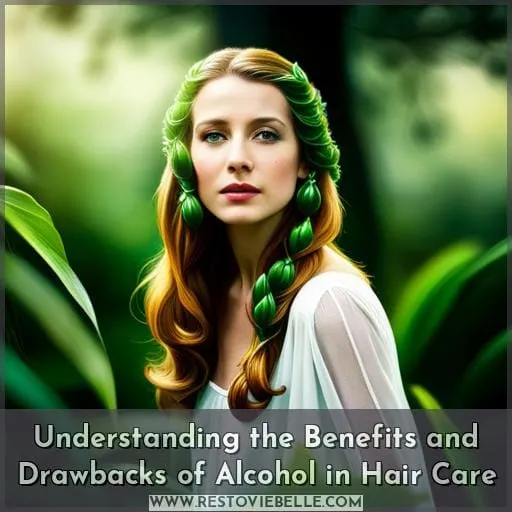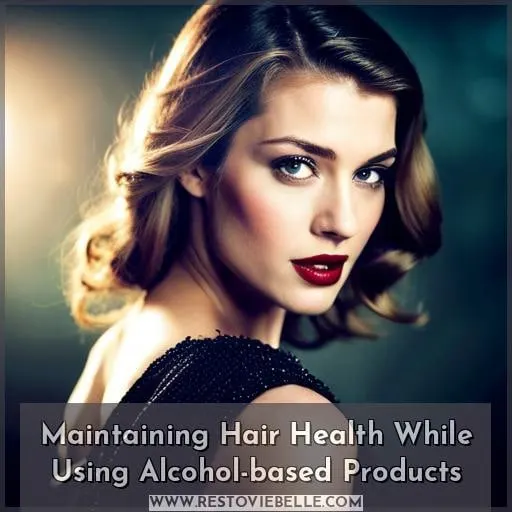This site is supported by our readers. We may earn a commission, at no cost to you, if you purchase through links.
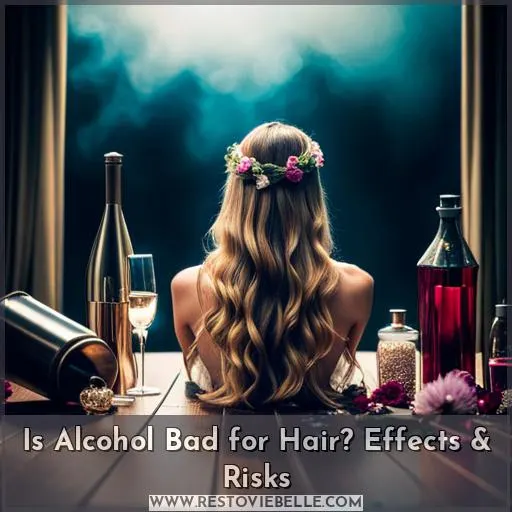 Are you wondering whether alcohol is bad for your hair? It’s a valid question – and one that has multiple answers. According to the National Institute on Alcohol Abuse and Alcoholism, 1 in 8 adult Americans struggle with an alcohol use disorder.
Are you wondering whether alcohol is bad for your hair? It’s a valid question – and one that has multiple answers. According to the National Institute on Alcohol Abuse and Alcoholism, 1 in 8 adult Americans struggle with an alcohol use disorder.
In this article, we’ll explore how different types of alcohols can affect your hair health as well as discuss any potential risks associated with excessive consumption or using too many products containing them.
We’ll also provide tips for maintaining healthy locks while still using these useful ingredients in moderation when necessary.
So let’s dive into it: Is alcohol bad for hair?
Table Of Contents
Key Takeaways
- Long-chain fatty alcohols like cetearyl alcohol can hydrate, detangle, and nourish hair.
- Excessive alcohol use can lead to dehydration and nutrient loss, causing drying, frizz, and breakage.
- Alcohol use disorder can impact hair health, including scalp sensitivity and hair thinning.
- Balancing hydration and evaporation is crucial for maintaining healthy hair.
The Different Types of Alcohols in Hair Care Products
When it comes to hair care products, one must distinguish between the two main types of alcohols: short-chain alcohols and long-chain alcohols. Short-chain alcohols are fast-evaporating with moisture-wicking properties that can be damaging when used on dehydrated hair, while long-chain fatty alcohols hydrate and detangle.
Short Chain-alcohols
You may have heard of short-chain alcohols and their ability to quickly evaporate moisture, but did you know that they can also be damaging for dehydrated hair? These alcohols are commonly found in styling products due to their fast drying properties.
They can strip away natural oils from the scalp, leading to further dehydration and ultimately hair damage.
To maintain healthy locks, opt for an alcohol-free product or one with long-chain fatty alcohols, which provide hydration without stripping away precious moisture.
Long Chain-alcohols
Long-chain fatty alcohols, such as cetearyl alcohol, are beneficial for hair health. They provide hydration and detangling properties, reducing frizz, tangles, and leaving the hair feeling nourished. Cetearyl alcohol works by retaining moisture in the scalp and preventing other ingredients from evaporating too quickly.
Other examples of long-chain fatty alcohols include cetyl esters, stearic acid, and lanolin derivatives like myristyl or tridecyl alcohols. These alcohols help protect against dryness without weighing down the strands. They also have conditioning abilities on each individual strand of hair, which can help avoid hair concerns such as breakage or split ends.
By incorporating products with long-chain fatty alcohols, you can improve the overall health and appearance of your hair. These ingredients provide essential moisture and nourishment, keeping your hair hydrated, detangled, and protected against dryness.
So, if you’re looking for a solution to your hair concerns, consider trying products that contain long-chain fatty alcohols.
The Impact of Alcohol on Hair Health
Are you aware of the impact that alcohol can have on your hair health? Alcohols in hair care products may cause drying effects and potential damage to the scalp, making it important for individuals to understand which types are beneficial or detrimental.
Thus, it is essential for consumers to identify good versus bad alcohols when selecting hair care items.
Drying Effects of Alcohol
Feel the effects of alcohol on your hair as it evaporates fast, taking away vital moisture and leaving strands dehydrated. Overuse of alcohol-based products can quickly lead to dryness, frizziness, and breakage.
To maintain healthy hydration levels in your locks, combat dryness by avoiding overuse or excessive consumption of alcoholic beverages.
Balance moisture with hydrating strategies like using sulfate-free shampoos and conditioners that are free from drying agents like short-chain alcohols such as SD Alcohol 40/alcohol denat.
Potential Damage to Hair
Excessive consumption of alcohol can lead to dehydration and a lack of essential minerals, both of which can have a detrimental effect on your hair. Nutritional deficiencies caused by drinking too much alcohol will make your hair weak and brittle, leading to breakage or even loss.
To avoid this, it is important to maintain a hydration balance with non-alcoholic alternatives such as fatty acids or coconut oil that help retain moisture in the scalp. A trichologist may also be consulted for insights into how best to care for your locks without compromising its health due to excessive use of alcoholic products.
The Relationship Between Alcohol Consumption and Hair Loss
The relationship between alcohol consumption and hair loss is complex. While moderate drinking can have some health benefits, excessive intake of alcoholic beverages has been linked to both short-term and long-term negative impacts on your hair health.
Therefore, it’s important to understand how alcohol affects your scalp in order to ensure healthy locks for years to come.
Drinking in Moderation
Consuming alcoholic beverages in moderation is essential for maintaining healthy hair and a balanced lifestyle. Over-indulging can lead to dehydration, which has adverse effects on the scalp and follicles.
Different types of alcohols should also be considered when selecting hair care products. Shorter chain alcohols like SD Alcohol 40/alcohol denat are known to cause dryness, whereas long-chain fatty alcohols such as cetearyl alcohol provide hydration without compromising scalp health.
Personalized care is important too. Understanding your own needs will help you achieve optimal hair health through proper nutrition, frequent trims, and avoiding excessive heat styling tools or overuse of product build-up while drinking moderately.
The right balance between all factors ensures healthier-looking locks that last longer!
Short-term Health Risks
Do you know the short-term health risks of overindulging in alcohol? Scalp sensitivity can increase due to dehydration and loss of nutrients, leading to hair thinning. Trichologists advise that a balance between moisture and hydration should be maintained for optimal hair growth.
Cetyl alcohol is an example of a beneficial ingredient as it helps with conditioning, but too much can dry out strands.
Long-term Health Risks
Regularly consuming alcoholic drinks can lead to long-term health risks, such as hair loss. Alcohols often found in beauty products and beverages impact hydration levels, which affects the moisture balance of our hair.
Dehydrated hair requires specific solutions, like avoiding hot tools and using sulfate-free shampoo, to restore its natural shine.
Moreover, alcohol consumption can also deplete minerals essential for healthy locks, leading to further damage over time. Sustainable beauty means more than just making conscious choices; it’s important for us all to establish a balanced approach with regular maintenance routines, including taking supplements where necessary.
Understanding the Benefits and Drawbacks of Alcohol in Hair Care
Are you wondering if alcohol in hair care products is beneficial or damaging? It’s a valid question as different types of alcohols can have both positive and negative effects on hair. Short-chain alcohols, for instance, are known to possess fast evaporation and moisture-wicking properties, but they may also be drying for dehydrated hair.
Long-chain fatty alcohols, however, offer benefits such as hydration and detangling capabilities without the same drying effect. Understanding which type of hair care product works best with your individual needs will help you maintain healthy locks while avoiding potential damage from excessive use.
Benefits of Alcohol in Hair Care Products
Incorporating certain types of alcohol in your hair care routine can provide beneficial properties to help keep it healthy. Alcohol plays a multi-faceted role in hair care products. It provides moisture balance and styling benefits, as well as aids with hydration effects.
Educating yourself on the ingredients lists of your hair care products will allow you to understand which alcohols are good for maintaining a balanced scalp environment.
Cetearyl Alcohol, Behentrimonium Chloride, Stearamidopropyl Dimethylamine, and Isosteareth-20 are all beneficial for adding strength and shine to your hair. It is important to avoid short chain alcohols like SD (Alcohol Denat) or Ethanol, as they can dry out your strands excessively.
Additionally, avoiding these alcohols can help preserve color treatments better than other types of ingredients found in many hair care formulas.
Potential Damage and Drying Effects
You’re likely aware of the potential damage and drying effects that certain types of alcohol can have on your hair. Too much usage strips moisture, leading to damaged ends and a dry scalp. Hair requires a balance between hydration retention and evaporation to remain healthy.
To combat these risks, opt for styling products with non-drying alternatives like fatty acids. Fatty acids promote moisture retention instead of stripping it away. You can also incorporate zinc and folic acid into your haircare routine through masks or conditioners.
Alcohol-free formulations are just as effective at providing detangling properties without the risk of dehydration.
Maintaining Hair Health While Using Alcohol-based Products
It is important to understand the impact of alcohol in hair care products and how moderation plays an essential role in ensuring healthy hair. To prevent damage and dryness, it is recommended to be mindful when using alcohol-based products.
Opt for hydrating ingredients such as cetearyl alcohol that can improve texture without causing harm. Understanding your personal needs will help you find the best balance between protecting your strands while still enjoying styling options.
Importance of Moderation in Alcohol Consumption
Maintaining healthy hair and scalp while using alcohol-based products requires moderation – otherwise, your locks could be left in a state of absolute devastation! To achieve a balanced hydration, eat a well-balanced diet and limit beer consumption.
It is important to maintain an overall moderate level of alcohol intake. Note the health implications associated with excessive drinking, as it can lead to dehydration that weakens and damages strands.
Follow haircare tips such as shampooing not more than two or three times per week for optimal hydration levels. With mindful use of these products, you will find a better balance between preserving moisture while still achieving desired styling results.
Tips for Preventing Damage and Dryness
Taking care of your hair while using alcohol-based products doesn’t have to be a hassle.
- To maintain moisture, try nourishing hair care products with naturally hydrating ingredients like aloe vera or coconut oil.
- For extra hydration, use moisturizing beauty products that don’t contain sulfates or parabens. Look for vegan society certified and cruelty-free international approved labels on the packaging.
- Keep your scalp healthy by balancing your diet with sparkling water-based cocktails over sugary drinks when possible.
- Finally, lock in moisture by steering clear of hot styling tools that can strip away natural oils from your strands!
Conclusion
It’s clear that alcohol can have both positive and negative effects on hair health. Moderation is key to avoiding the risks associated with excessive alcohol consumption.
For example, Josh was an avid drinker who was unaware of the potential long-term damage to his hair due to his drinking habits. After a visit to the trichologist, he began to understand how to use alcohol-based products in a more mindful and responsible way.
By understanding the different types of alcohols, their effects on hair, and the importance of moderation in alcohol consumption, Josh was able to maintain a healthy head of hair.
It’s important to recognize that although alcohol can be beneficial in hair care products, it can also cause damage if used in excess.

